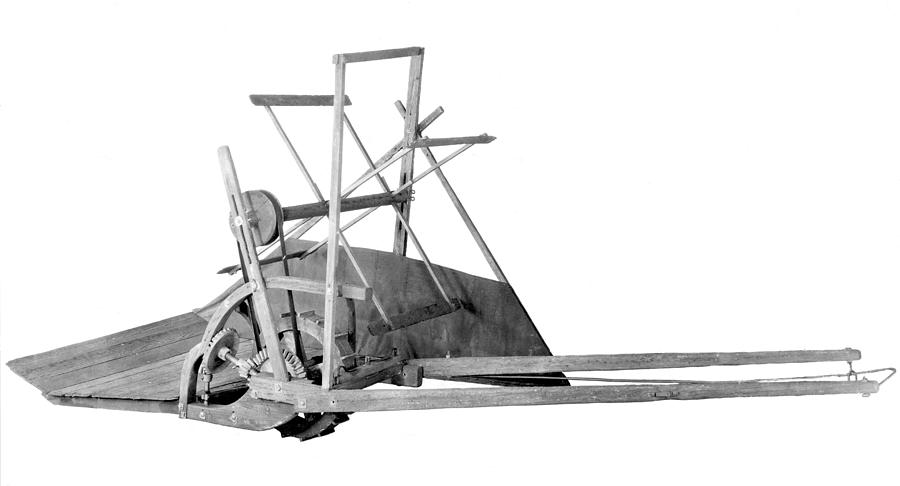
After a few additional modifications, he patented the invention in 1834.ĭuring the 1840s Cyrus and his family manufactured and sold reapers out the blacksmith shop at Walnut Grove. Cyrus made several changes to his father's design and successfully demonstrated his reaper at Steele's Tavern, Virginia, in July 1831. In 1831 he abandoned the idea and turned the work over to his son. His father, Robert McCormick, experimented with a design for a mechanical reaper from around the time of Cyrus' birth. He was born at the family farm called Walnut Grove in Rockbridge County, Virginia, on February 15, 1809. McCormick (1809-1884) was an industrialist and inventor of the first commercially successful reaper, a horse-drawn machine to harvest wheat. For more information, call (540) 377-2255 or visit Hall McCormick View the original source document: WHI 8499Ĭyrus H. A grist mill and a blacksmith shop – as well as a life-sized replica of the original reaper and other farm equipment – are on display. Visit Cyrus McCormick’s Virginia farm in Steeles Tavern, Va., which is a National Historic Landmark. – For additional information about McCormick’s reaper revolution, read 300 Years of Farm Implements by Ron Barlow or International Harvester Farm Equipment by Ralph Baumheckel and Kent Borghoff. In 1873, the new factory opened its doors, positioning Cyrus and his company for a successful and lucrative future in the reaper and farm machinery market, which ultimately led to the formation of International Harvester Co. Annual reaper capacity of the old factory was limited, but the new factory had a whopping 300,000 feet of floor space, including ample testing fields. The fire was a blessing in disguise because it essentially destroyed an outdated factory. Cyrus was distraught with grief, but vowed to rebuild the factory bigger and better than ever before.

It seemed nothing could stop the growth of Cyrus’ reaper business -until fire engulfed the factory in 1871, leveling his Chicago facility and destroying $2 million in inventory. By 1870, Cyrus sold more than 10,000 reapers a year. Cyrus was a savvy businessman and used newspaper ads, product warranties and installment plans to boost sales. The reaper’s efficient production power wasn’t the only thing that made them popular. Cyrus became a world celebrity and an international sensation. In 1851, Cyrus’ reaper won the highest award of the day: A gold medal at London’s Crystal Palace Exhibition. in Chicago to meet the swelling demand for his reapers. In 1847, he founded the McCormick Harvesting Co. By 1849, another seat was added for the driver, and a sickle – made in sections – replaced the straight knife in 1851.Ĭyrus realized an untapped market existed in the large, open fields in the Midwest. In 18, Cyrus added a seat for the raker, a cutting apparatus, reel divider and a platform.

The noisy machine is said to have scared horses, but it made a farmer’s job much easier. Cyrus, however, won market supremacy for his patent by using better business tactics, eliminating Obed from the reaper market.ĭuring the 1840s and 1850s, Cyrus continued to improve his reaper by building on Obed’s formula and pushing for worldwide distribution. Obed Hussey of Baltimore, Md., had patented a reaper of his own one year earlier, which by many accounts was the most improved over earlier devices and nearer in design to later successful models. Cyrus’ horse-drawn reaper used back-and-forth-moving cutting blades and a revolving device to push cut grain onto the back of the machine. For three years, Cyrus toiled on a machine and finally secured a patent in 1834.

Cyrus’ father, Robert McCormick, had extensively researched the mechanical reaper, but his design was never perfected. The machine’s speed increased crop yields, decreased the number of farmhands needed and helped turn the Midwest into the nation’s breadbasket.īeginning in 1831, 22-year-old Cyrus McCormick continued his father’s failed quest to produce a mechanical reaper design.

McCormick’s reaper could cut more wheat in a day than a half-dozen farmhands. His invention, the McCormick ‘Virginia’ reaper, revolutionized farming by combining many steps involved in harvesting crops into one machine. Few people changed American agriculture more than Cyrus McCormick.


 0 kommentar(er)
0 kommentar(er)
